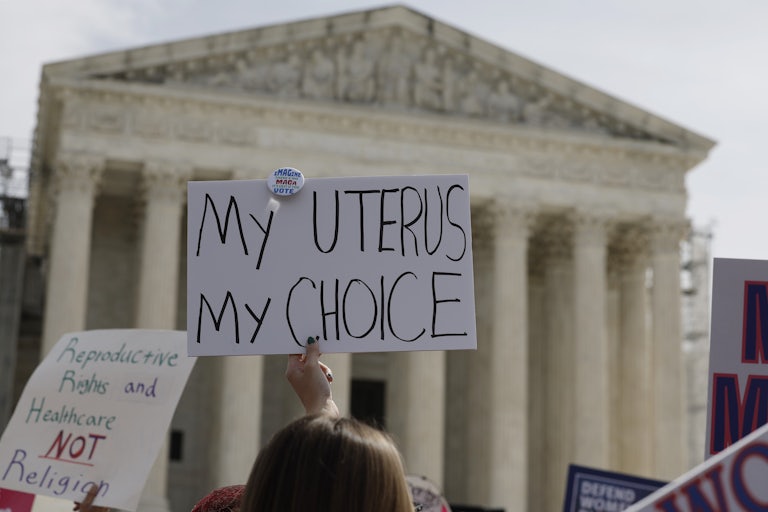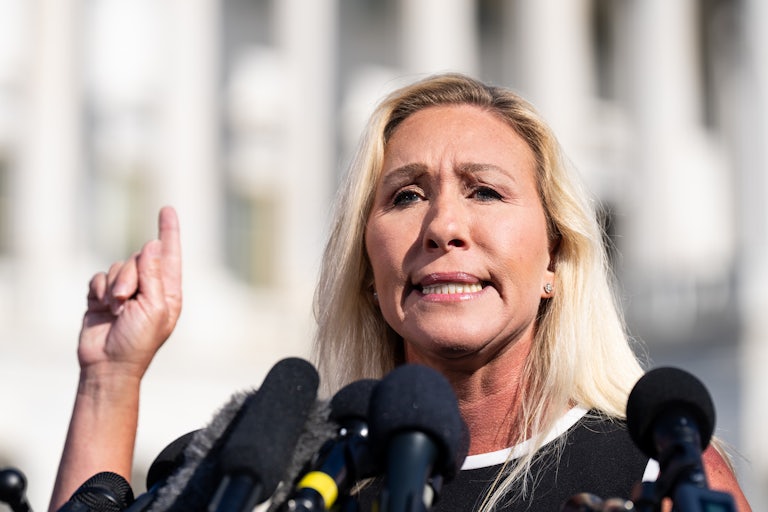Supreme Court Shocks Everyone by Saving Abortion Pill—for Now
The conservative-majority court ruled against a challenge to mifepristone, one of the medications used to induce an abortion.

The Supreme Court decided Thursday that an anti-abortion group does not have legal standing to sue the Food and Drug Administration over mifepristone, guaranteeing national access to abortion medication under U.S. law.
A coalition of anti-abortion doctors and activists challenged access to mifepristone in November 2022, alleging that the FDA had overstepped its role by taking several steps that expanded access to the drug in 2016. The plaintiffs, represented by the right-wing Christian organization Alliance Defending Freedom, sought to overturn the FDA’s approval and have mifepristone pulled from the market.
In a unanimous opinion, the court ruled that the group had no standing to sue the federal agency and that it had failed to demonstrate how it was personally harmed by the drug’s existence on the market.
“Under Article III of the Constitution, a plaintiff’s desire to make a drug less available for others does not establish standing to sue. Nor do the plaintiffs’ other standing theories suffice. Therefore, the plaintiffs lack standing to challenge FDA’s actions,” Justice Brett Kavanaugh wrote, later specifying that “citizens and doctors do not have standing to sue simply because others are allowed to engage in certain activities—at least without the plaintiffs demonstrating how they would be injured by the government’s alleged under-regulation of others.”
Mifepristone and misoprostol comprise the two-step prescription referred to as “the abortion pill.” Together, they account for more than half of all the abortions in the United States, according to a 2022 report by the Guttmacher Institute.
The case, FDA v. Alliance for Hippocratic Medicine, was the biggest challenge to national reproductive access since the court’s conservative supermajority overturned Roe v. Wade in June 2022. The battle truly kicked off in April the following year, when a Trump-appointed judge in Texas halted access to the drug.
Four months later, the Fifth U.S. Circuit Court of Appeals sided with the plaintiffs, ruling that while the pill was safe for market, the FDA had improperly approved expanded access. Those steps included allowing women to access mifepristone 10 weeks into pregnancy instead of seven, lowering the standard dosage, and allowing the prescription to be accessed via telemedicine.
To be clear, the Supreme Court’s decision hinges on the legality of the case, not on whether people have a right to bodily autonomy. The high court ruled that the Fifth Circuit’s decision failed to find a basis in the U.S. Constitution.
“The plaintiffs have sincere legal, moral, ideological, and policy objections to elective abortion and to FDA’s relaxed regulation of mifepristone,” Kavanaugh wrote. “But under Article III of the Constitution, those kinds of objections alone do not establish a justiciable case or controversy in federal court. Here, the plaintiffs have failed to demonstrate that FDA’s relaxed regulatory requirements likely would cause them to suffer an injury in fact. For that reason, the federal courts are the wrong forum for addressing the plaintiffs’ concerns about FDA’s actions.”
Instead, Kavanaugh suggested that the plaintiffs take their issues to the president, setting up another fight to maintain abortion access should Donald Trump win in November.
By and large, most Americans support abortion access. In a 2023 Gallup poll, just 13 percent of surveyed Americans said that abortion should be illegal in all circumstances. Meanwhile, 34 percent said it should be legal under any circumstances, and an additional 13 percent said it should be legal in most circumstances.
This story has been updated.








